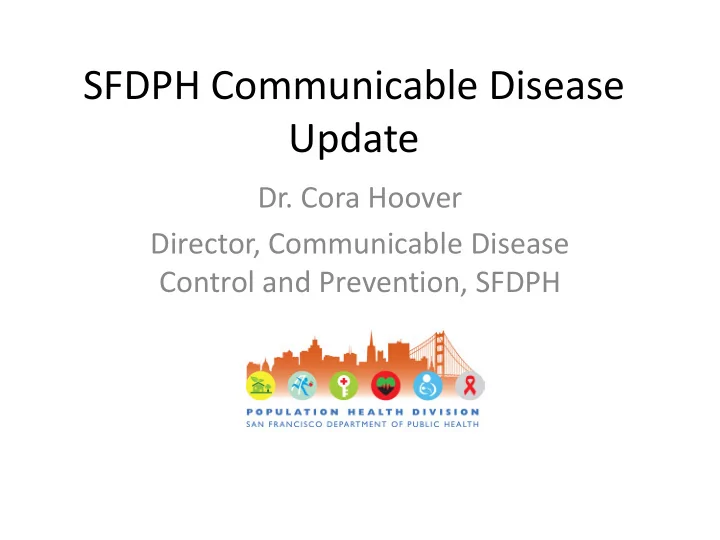

SFDPH Communicable Disease Update Dr. Cora Hoover Director, Communicable Disease Control and Prevention, SFDPH
SFDPH Communicable Disease Update • Ebola monitoring • Shigella update/outbreak • Measles outbreak • Seasonal influenza
Ebola monitoring • The Ebola epidemic in West Africa is stabilizing/improving in most areas. • SFDPH continues to monitor travelers returning from Ebola-affected countries in West Africa. • These travelers are identified through CDC’s airport screening process and information is passed along to SFDPH. • Returning travelers are interviewed to assess potential exposures and risk status. • Health Officer Orders are issued to reinforce monitoring process.
Ebola monitoring • The purpose of monitoring is to assess daily for symptoms and fever so that any potential illness is caught early and referral for medical evaluation can be made in a controlled fashion. • We monitor daily by phone and/or video conference for a 21-day period after the person’s departure from the Ebola-affected country. • Monitoring is done by nurses. • Monitoring has been going smoothly; returning travelers have been cooperative and accepting of monitoring. • We have successfully monitored approximately 30 individuals over the last few months.
Shigella update • Shigella is a bacterium that causes a highly contagious gastroenteritis. • Spread is fecal-oral (microscopic amount of feces getting in someone’s mouth or on food). • Common in developing countries; less common in United States. • SF normally has about 100 cases per year; a large outbreak in the gay community 15 years ago that went on for over a year.
Usual approach to Shigella—single cases • SFDPH normally has 5-10 Shigella case reports per month. These are generally positive stool culture results reported to us by labs. • Each case is contacted and interviewed by phone to ascertain potential exposures and whether the person is in a “sensitive occupation or setting.” • Case finding among contacts is also done. • Patterns (e.g. exposures/place/time) indicating an outbreak are sought but we usually don’t identify a source for individual cases.
Shigella outbreak • Current outbreak of Ciprofloxacin-resistant Shigella began in November and is continuing. • 181 cases have been identified so far. Despite extensive investigation and data analysis we have not found any common exposure or source for the outbreak. • About 48% of cases are homeless or live in residential hotels with shared bathrooms. • We attempting to interview all cases, but many are hard to reach by phone; if we are unable to interview, we review medical records. • Information was disseminated to the medical community via Health Advisory in late December.
Shigella outbreak • We are partnering with homeless outreach team (HOT), homeless service organizations to share hygiene supplies and information concerning the importance of seeking medical care when ill. • Over 20,000 hand sanitizer towelettes have been distributed to programs that serve the homeless. • We are working with SFDPH Environmental Health Branch to inspect soup kitchens, shelters, and residential hotels and educate staff to eliminate sources of spread (examples are cleaning of facilities; supplying hand sanitizer before meals). • It looks as if outbreak is likely slowing down but it is too early to know for sure.
Measles outbreak • Measles is a highly contagious virus that causes an infection with high fever, rash, and cough. It is spread through the air. • Measles vaccine is safe and extremely effective. Most people in the US are immune to measles because they have been vaccinated. • Measles outbreak in CA since late December 2014 • There are 110 cases statewide so far. For those cases for whom vaccination status is known, most are unimmunized.
Measles outbreak • San Francisco schoolchildren are immunized against measles at approximately the same rate as children statewide (90%). • San Francisco has a low rate of Personal Belief Exemptions (PBEs). • Some schoolchildren are “conditional entrants”— allowed to enter school while some immunizations are pending. • SFDPH is working with SFUSD to provide free measles vaccine for children who are not up-to- date on their immunizations.
Measles outbreak • Most Bay Area Counties have reported measles cases. • There have been no cases in San Francisco residents associated with this outbreak. • An individual who lives in Contra Costa County, rode BART and worked in San Francisco during his infectious period was confirmed to have measles. Information was released to the media on 2/11. • SFDPH is working closely with the individual’s employer (LinkedIn) to inform employees regarding the workplace exposure and to manage the exposure. The employer is cooperating fully. • It is possible that additional cases may result from this exposure but we don’t know of any at this time. • A updated Health Advisory was distributed to the medical community on 2/11.
Seasonal Influenza • Seasonal influenza is starting to wane. • It looks as if this was a medium-to-severe season but we never know for sure until afterwards. • Vaccine efficacy limited this year due to mismatch. Predominant strain H3N2, tends to affect the elderly more severely. • SF has had 1 death reported in an individual under 65 and has responded to 11 outbreaks in long term care facilities so far this season.
Recommend
More recommend